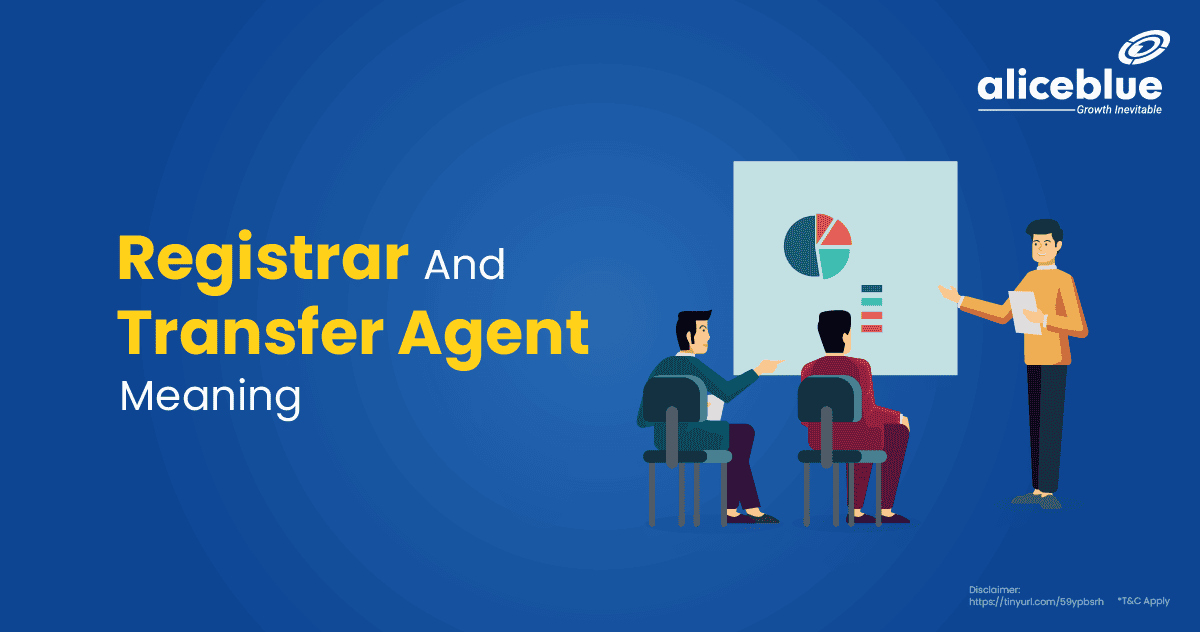A Registrar and Transfer Agent (RTA) is a specialized financial institution that registers and maintains detailed records of transactions and investor accounts for mutual funds and other financial instruments. They handle issuing and redeeming fund units, processing dividends, and managing investor communications and queries.
Content:
- What Is RTA?
- Registrar And Transfer Agent Example
- Role Of Registrar And Transfer Agent
- How To Become Registrar And Transfer Agent?
- Registrar And Share Transfer Agent Charges
- Difference Between Registrar And Transfer Agent
- List Of Registrar And Transfer Agent In India
- RTA Meaning – Quick Summary
- Registrar And Transfer Agent Meaning – FAQs
What Is RTA?
A Registrar and Transfer Agent (RTA) is a key intermediary in the financial services sector, primarily engaged in maintaining records of investor transactions for mutual funds and other securities. RTAs facilitate the seamless management of customer investments, including registering transactions, transferring ownership, and maintaining accurate and updated records.
RTAs play a crucial role in investor servicing, handling tasks such as processing investor applications, redemptions, and switch transactions. They ensure efficient and accurate record-keeping, which is essential for the integrity of financial markets. RTAs also manage distributions like dividends or interest payments on behalf of the fund houses.
Furthermore, RTAs provide critical support in terms of investor communication, issuing account statements, and handling inquiries and grievances. Their role extends to ensuring regulatory compliance in maintaining investor records. As a bridge between investors and fund houses, RTAs contribute significantly to the smooth operation of the investment process, enhancing investor confidence and trust in the financial system.

Registrar And Transfer Agent Example
A Registrar and Transfer Agent (RTA) example in the financial sector is a company like Computershare or Karvy, which manages investor data for mutual funds and stocks. These RTAs handle the administrative and clerical tasks associated with maintaining investor accounts and processing transactions.
For instance, when an investor buys or sells mutual fund units, the RTA records the transaction, updates the investor’s holdings, and ensures the correct allocation of units. They manage the complex details of tracking purchases, sales, and ownership, providing a vital link between the investors and the mutual funds.
In addition to transaction processing, RTAs also handle investor queries and provide regular account statements, helping investors track their investments. They are responsible for managing distributions such as dividends and handling corporate actions like stock splits or bonus issues, ensuring investors receive the benefits and information they are entitled to. Their role is integral to maintaining the integrity and efficiency of the investment process.
Role Of Registrar And Transfer Agent
The main role of a Registrar and Transfer Agent (RTA) is to maintain and manage detailed investor records for mutual funds and stocks. They handle transactions, issue and redeem units, process dividends, and provide investor services like account statements and handling queries.
- Maintaining Investor Records
RTAs meticulously record all investor transactions and holdings in mutual funds and stocks, ensuring accurate and up-to-date investor data, which is crucial for both regulatory compliance and investor confidence.
- Processing Transactions
They manage the administrative aspects of buying, selling, and transferring units or shares, including updating holdings, processing redemptions, and allocating units for mutual fund investors.
- Dividend Processing and Distributions
RTAs handle the calculation and distribution of dividends or interest payments to investors, ensuring timely and accurate disbursement in line with fund declarations.
- Investor Services
Providing a range of investor services, including responding to queries, issuing regular account statements, and managing communications, RTAs are essential in maintaining investor relations and facilitating smooth transactions.
- Regulatory Compliance and Reporting
They ensure compliance with regulatory requirements in maintaining investor records, reporting transactions, and other necessary disclosures, playing a key role in upholding the integrity of the financial markets.
How To Become Registrar And Transfer Agent?
To become a Registrar and Transfer Agent (RTA), one must acquire relevant financial knowledge, often through a degree in finance or a related field. Then, obtain certification and registration from regulatory authorities like SEBI in India, followed by gaining experience in financial services and compliance.
- Acquire Financial Education
Begin with a degree or relevant qualifications in finance, business administration, or a related field to understand the financial and securities markets, essential for RTA responsibilities.
- Obtain Certification and Registration
Secure necessary certifications and register with financial regulatory bodies like SEBI in India. This involves passing exams and meeting regulatory criteria to ensure competence and adherence to industry standards.
- Gain Industry Experience
Work in financial services, particularly in areas related to securities and investor relations. Experience in handling financial transactions, customer service in finance, and understanding regulatory compliance is crucial for an RTA role.
- Develop Compliance Knowledge
RTAs need a strong grasp of regulatory compliance and reporting requirements. Developing expertise in these areas ensures the ability to manage investor records and transactions according to legal and regulatory standards.
- Establish a Firm or Join an RTA Company
After acquiring the necessary qualifications and experience, you can establish an RTA firm or join an existing one. This step involves understanding business operations, client management, and developing a network in the financial services sector.
Registrar And Share Transfer Agent Charges
Registrar and Share Transfer Agents are charged for maintaining investor records and managing transactions for mutual funds and stocks. Their fees vary based on service complexity, and transaction volume, and are typically paid by the mutual funds or companies, not directly by individual investors.
The fee structure for RTAs may include a fixed fee for certain services, like processing investor applications or managing dividend distributions, and a variable component based on the number of transactions or accounts managed. This approach ensures that the charges align with the scope and scale of the services required.
Additionally, RTAs might charge for specialized services like handling complex corporate actions, investor communications, or providing detailed reporting and compliance services. These fees are usually negotiated between the RTA and the mutual fund or company, reflecting the bespoke nature of the services offered, the level of expertise required, and the overall market conditions.
Difference Between Registrar And Transfer Agent
The main difference is that a registrar maintains the register of shareholders, handling issues like allotment of shares, while a Transfer Agent manages the transfer of securities between owners, processing sales and purchases, and ensuring the accurate recording of these transactions.
| Criteria | Registrar | Transfer Agent |
| Primary Function | Maintains shareholder register | Manages transfer of securities |
| Key Responsibilities | Allotment of shares, recording new ownership | Processing sales, purchases of securities |
| Interaction | Involvement in initial share issuance | Active in secondary market transactions |
| Documentation | Handles documentation for new shareholders | Manages documentation for transferring ownership |
| Investor Relation | Primarily during share issuance and corporate actions | Continuous, handling of ongoing transactions |
List Of Registrar And Transfer Agent In India
In India, prominent Registrar and Transfer Agents include companies like Computer Age Management Services (CAMS), Karvy Computershare, and Link Intime India. These RTAs play a crucial role in the country’s financial market, managing investor records and transactions for mutual funds and corporate securities.
Computer Age Management Services (CAMS) and Karvy Computershare are among the largest in the industry, providing services to a significant portion of India’s mutual fund assets. These companies handle tasks such as processing transactions, maintaining investor records, and facilitating communications between fund houses and investors.
Link Intime India, although smaller compared to CAMS and Karvy, specializes in handling public issues and corporate actions. They provide services like IPO processing, dematerialization of securities, and managing corporate registries. These RTAs ensure the seamless operation of the market by maintaining accurate and up-to-date investor information.

RTA Meaning – Quick Summary
- An RTA is crucial in financial services, maintaining investor transaction records for mutual funds and securities. They manage customer investments seamlessly, handling transaction registration, and ownership transfers, and ensuring precise, current records.
- An RTA in the financial sector, such as Computershare or Karvy, manages mutual fund and stock investor data. They handle crucial administrative and clerical tasks, including maintaining investor accounts and processing transactions.
- The main function of a Registrar and Transfer Agent is to meticulously manage and maintain investor records for stocks and mutual funds, handling transactions, unit issuance and redemption, dividend processing, and providing investor services such as account statements and query resolution.
- To become an RTA, acquire financial knowledge via a finance-related degree, then obtain certification and registration from authorities like SEBI in India, and gain experience in financial services and compliance.
- Registrar and Share Transfer Agents’ fees, varying with service complexity and transaction volume, are for maintaining investor records and managing transactions in mutual funds and stocks, typically paid by mutual funds or companies, not by individual investors.
- The main distinction is that registrars maintain shareholder registers, dealing with share allotments, whereas Transfer Agents manage security transfers between owners, processing sales and purchases, and ensuring accurate transaction recording.
- In India, key Registrar and Transfer Agents like CAMS, Karvy Computershare, and Link Intime India are integral to the financial market, expertly managing investor records and transactions for mutual funds and various corporate securities.
- Open free demat account with Alice Blue in 15 minutes today! Invest in Stocks, Mutual Funds, Bonds & IPOs for Free. Also, trade at just ₹ 15/order and save 33.33% brokerage on every order.
Registrar And Transfer Agent Meaning – FAQs
What Is RTA?
RTA, or Registrar and Transfer Agent, is a specialized financial intermediary responsible for maintaining records of investor transactions for mutual funds and securities, handling transfers, issuing and redeeming units, and managing investor communication and queries.
What Is A Transfer Agent Example?
An example of a transfer agent is Computershare, a global company that provides transfer agent services for various securities. They facilitate the transfer of ownership of securities and maintain accurate records of transactions.
What Is The Role Of A Transfer Agent?
The main role of a transfer agent is to facilitate the transfer of ownership of securities, maintain accurate records of transactions, handle the issuance and redemption of securities, and manage investor communications and inquiries.
What Are Transfer Agent Fees?
Transfer agent fees vary depending on the services provided, transaction volume, and complexity. They typically include charges for services such as processing transactions, maintaining records, and providing investor communications and inquiries support.
Who Needs A Transfer Agent?
Entities such as mutual funds, corporations issuing stocks or bonds, and other organizations issuing securities need a transfer agent to manage the transfer of ownership, maintain accurate records, and handle investor communications.
Who Appoints Transfer Agent?
Transfer agents are appointed by the issuer of securities, such as a mutual fund company or a corporation issuing stocks or bonds. The issuer selects and engages the transfer agent to manage investor transactions and records.
To gain a better understanding of the topic and access more information , explore the articles below that cover mutual funds, stock market insights, trading strategies, and organizational perspectives.






